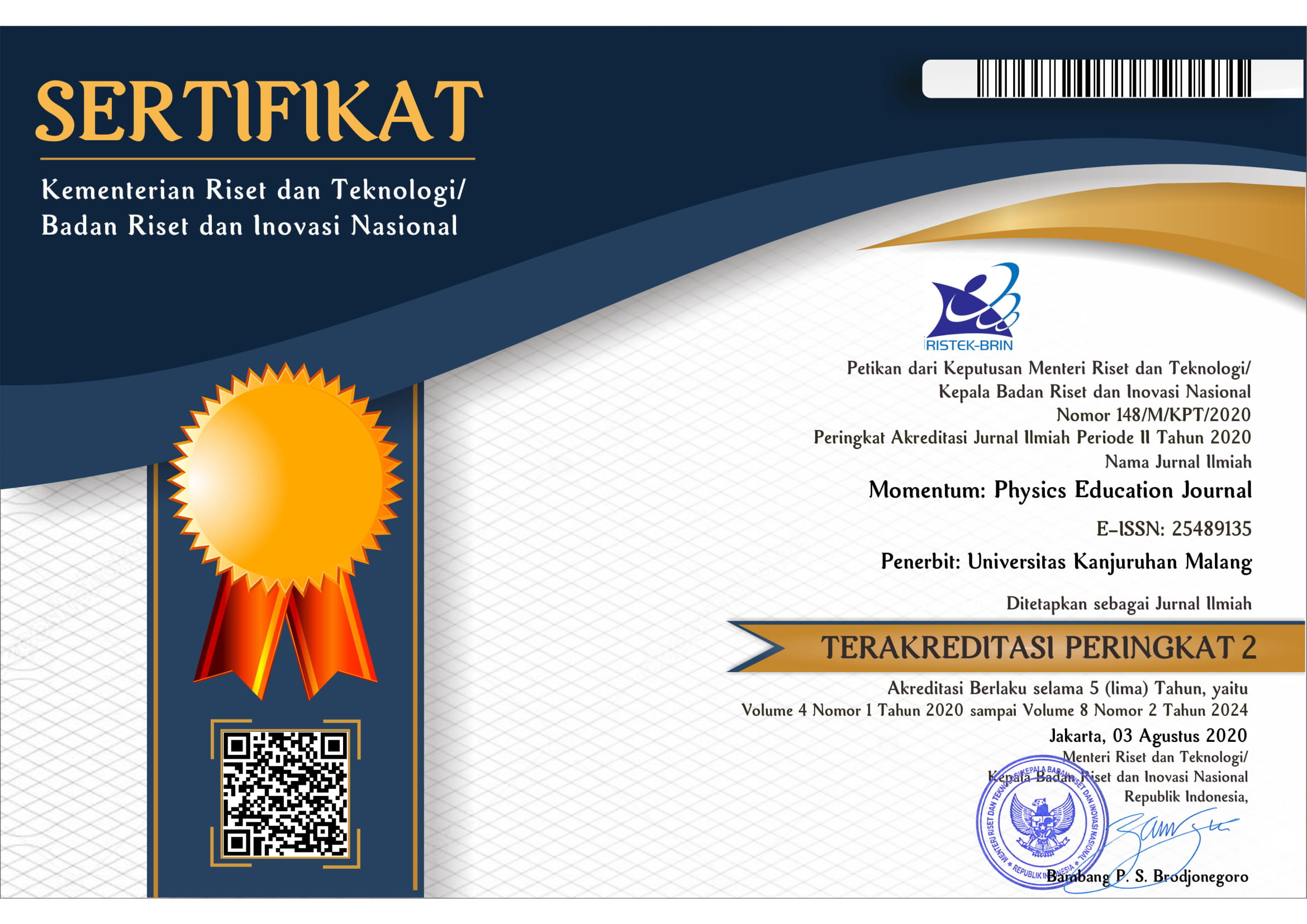Identifikasi penguasaan konsep fluida statis pada siswa
DOI:
https://doi.org/10.21067/mpej.v3i1.3346Keywords:
conceptual understanding, fluid static, students, penguasaan konsep, fluida statis, siswaAbstract
Abstract: A good conceptual understanding can help students in solving a problem, because with good conceptual understanding can precisely know the appropriate concept to be used in solving a problem. Static fluid is one of the most complex and fundamental topics in physics learning. However, there are still misconceptions experienced by students regarding this material such as the buoyant force and pressure principle. Therefore, an evaluation of static fluid material for students who have followed this material learning beforehand, to know whether the concept has been precise and meaningful. The method used is qualitative descriptive in the form of qualitative analysis and quantitative analysis to see the percentage of conceptual understanding of 100 students in SMAN 1 Turen. Percentage conceptual understanding on fluid static material can be described as follows, as much as 33,2% student still wrong concept, 40% of student already understood concept and 26,8% student still did not give the reason.
Abstrak: Penguasaan konsep yang baik dapat membantu siswa dalam memecahkan suatu permasalahan, karena dengan penguasaan konsep yang baik dapat secara tepat mengetahui konsep yang sesuai untuk digunakan dalam memecahkan suatu permasalahan. Fluida statis merupakan salah satu topik dalam pembelajaran fisika yang cukup kompleks dan mendasar. Namun masih saja terdapat miskonsepsi yang dialami oleh siswa mengenai materi ini misalnya tentang gaya apung dan prinsip tekanan. Maka dari itu diperlukan evaluasi mengenai materi fluida statis bagi siswa yang telah mengikuti pembelajaran materi ini sebelumnya, untuk mengetahui apakah konsep yang dimilikinya sudah tepat dan bermakna. Metode yang digunakan adalah deskriptif kualitatif berupa analisis kualitatif maupun analisis kuantitatif untuk melihat presentase penguasaan konsep 100 siswa di SMAN 1 Turen. Persentase penguasaan konsep siswa pada materi fluida statis dapat dijabarkan sebagai berikut, sebanyak 33,2% siswa masih salah konsep, 40% siswa sudah paham konsep dan 26,8% siswa masih tidak mengemukakan alasannya.
Downloads
References
Aji, S. D., & Hudha, M. N. (2016). Kerja Ilmiah Siswa SMP dan SMA Melalui Authentic Problem Based Learning (APBL). Jurnal Inspirasi Pendidikan, 6(1), 835-841.
Aji, S. D., Hudha, M. N., & Permatasari, A. (2016). Authentic Problem BasedLearning (APBL) untukMeningkatkan Kemampuan Pemecahan Masalah Fisika Siswa. Prosiding SNPS (Seminar Pendidikan Sains), 3, 299-302.
Aji, S. D., Hudha, M. N., & Rismawati, A. Y. (2017). Pengembangan Modul Pembelajaran Fisika Berbasis Problem Based Learning untuk Meningkatkan Kemampuan Pemecahan Masalah Fisika. Science Education Journal, 1(1), 36-51.
Barke, H-D., Hazari, A. & Yitbarek, S. (2009). Misconception in Chemistry. Addressing Perception in Chemical Education. Germany: Springer.
Barron, B., Darling, H., & Linda. (2008). Teaching for Meaningful Learning: A Review of Research on Inquiry Based and Cooperative Learning. Edutopia
Docktor, Jennifer L. and Mestre, José P. (2014). Synthesis of Discipline-Based Education Research in Physics. Physical Review Special Topics - Physics Education Research,10, 020119(58): 22-30.
Goszewski, M., Bazan, Z. & Wagner, D.J. (2013). Exploring Student Difficulties with Pressure in a Fluid. PERC Proceedings, Published by the American Association of Physics Teachers under a Creative Commons Attribution.
Hedge, B., & Meera, B. N. (2012). How do they solve it? An insight into the learners’s approach to the mechanism of physics problem solving. Physical Review Special Topics Physics Education Research, 8: 1-9.
Kemendikbud. (2014). Peraturan Menteri Pendidikan dan Kebudayaan RI Nomor 59 Tahun 2014 tentang Kurikulum 2013 Sekolah Menengah Atas/Madrasah Aliyah. Jakarta: Kementerian Pendidikan dan Kebudayaan RI.
Loverude, M. E. , Kautz, C. H. , Heron, R. L. (2003). Helping Students Develop an Understanding of Archimedes’s Principle. I. Research on Student Understanding. American Journal Physics. 71 (11): 1178-1187
Loverude, M. E. (2010). A Research Based Interactive Lecture Demonstration on Sinking and Floating. American Journal of Physics.
Lucangeli, D., Tressoldi, P. E., & Cendron, M. (1998). Cognitive and metacognitive abilities involved in the solution of mathematical word problems: Validation of a comprehensive model. Contemporary Educational Psychology, 23:257–275.
Prastiwi, Vicki D., Parno., Wisodo H. (2017). Identifikasi Pemahaman Konsep dan Penalaran Ilmiah Siswa SMA Pada Materi Fluida Statis. Momentum: Physics Educational Journal. Vol.1 (1) 1-15. (http://ejournal.unikama.ac.-id/index.php/momentum/index)
Ryan, Q. X., Frodermann, E., Heller, K., Hsu, L., & Mason, A. (2016). Computer problem-solving coaches for introductory physics: Design and usability studies. Physical Review Special Topics-Physics Education Research, 12(1):1-17.
Sajadi, M., Amiripour, P., Rostamy, M & Malkhalifeh. (2013). Examining Mathematical Word Problems Solving Ability Under Efficient Represetation Aspect. Mathematical Education Trend and Research: 1-11.
Serway, Raymond A. dan Jewett, John W. (2010). Physics for Scientists and Engineers 6th Edition. California: Thomson Brooks/Cole
Solehudin. (2016). Pengembangan Fdt (Fluid Diagnostic Test) Berbentuk Isomorfik sebagai Instrumen Diagnostik Miskonsepsi Pada Materi Fluida. Malang: Universitas Negeri Malang
Downloads
Published
How to Cite
Issue
Section
License
Copyright (c) 2019 Momentum: Physics Education Journal

This work is licensed under a Creative Commons Attribution-ShareAlike 4.0 International License.


.png)
.png)
.png)
.png)




